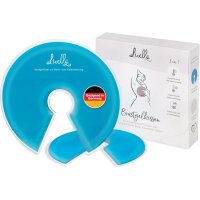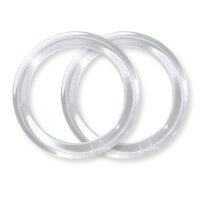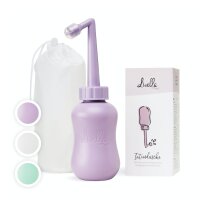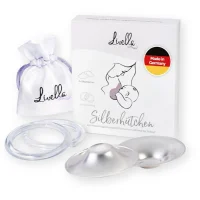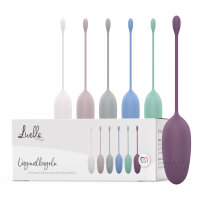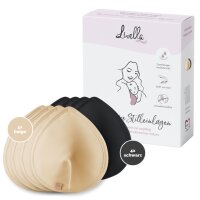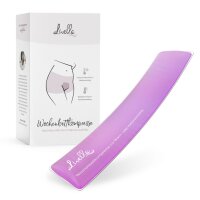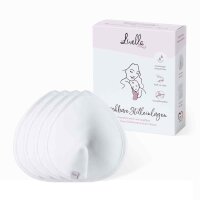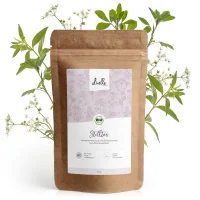Why is breastfeeding important? This question is often raised by pregnant women in the last weeks before birth when it’s time to decide on how they want to feed their baby.
All major health organisations and institutions working in the fields of health, pregnancy and nutrition recommend breastfeeding instead of bottle-feeding. The reason for this is simple. Breastfeeding provides numerous advantages for mother and baby.
Why is breastfeeding so much better than bottle-feeding? What are the benefits of breastfeeding? Read on as we dive deep into the advantages breastfeeding holds for you and your baby, including health-related, psychological and emotional benefits
Table of contents
Benefits of breastfeeding for mother and baby
Benefits of breastfeeding: the best form of nutrition for babies
Health benefits of breastfeeding for babies
Long-term health benefits of breastfeeding
The importance of breastfeeding for mother-child bonding
Benefits of breastfeeding for mum
Summary: why is breastfeeding important?
Benefits of breastfeeding for mother and baby
Recognised institutions such as the World Health Organisation (WHO) and UNICEF recommend exclusive breastfeeding for the first six months of life. And even thereafter, it is recommended to continue breastfeeding alongside feeding solid foods. This shows how important breastfeeding is for both mother and baby.
But what makes breastfeeding so special? Breastfeeding offers many advantages. The main benefits of breastfeeding are that it:
- meets all of your baby’s nutritional needs and strengthens your baby's immune system
- lowers the risk of your baby developing certain diseases later in life
- promotes the emotional bond between you and your baby
- has a positive effect on your body and your emotional state
Let's look at each of these benefits in more detail.

Benefits of breastfeeding: the best form of nutrition for babies
Compared to formula, breast milk offers your baby not only nutrients, but also many important immune factors and so-called bioactive components that support your baby's development. Breast milk is absolutely unique in its composition and contains many components that cannot be reproduced artificially. This is what makes it superior to formula.
If you look at breast milk from a scientific perspective, you can distinguish different components:
- Macronutrients (fat, protein and carbohydrates)
- Micronutrients (vitamins, minerals and more)
- Bioactive components (hormones, enzymes and growth factors)
- Immune factors and stem cells
- Probiotic bacteria
Good to know: The vitamin levels in your breast milk largely depend on the amount of vitamins you take in with your food. That's why it's important to eat a healthy breastfeeding diet. Learn more about how milk production works in our blog post on how to increase milk supply when breastfeeding.
Also, breastfeeding is the natural way of feeding your child in the first months of life. Breast milk, and especially the different proteins it contains, is very easy to digest. Compared to cow’s milk, which is the standard milk used in infant formula, breast milk is a lot easier to absorb for a newborn’s stomach.
Some additional benefits of breastfeeding include:
- Breast milk is completely free and always available.
- You don't have to worry about hygiene when breastfeeding.
- Breast milk always has the perfect temperature.
In short, breast milk is far better for your baby than formula. For one thing, it contains all the nutrients and immune factors your baby needs for healthy development. For another thing, it is always available and doesn’t cost a single penny.
Health benefits of breastfeeding for babies
Breast milk is a true miracle drink. The perfect combination of nutrients and the fact that it is easy to digest make it by far the best nutrition for your baby during the first few months of life. But breast milk is more than just a super food for newborns.
Thanks to the immune factors and bioactive components it contains, breast milk has a direct positive impact on your baby's health. It provides your baby with many important antibodies that protect him or her from diseases and infections. Also, breast milk works as an anti-inflammatory and fights harmful bacteria.
What’s more, breastfed children are less likely to suffer from diseases and infections affecting the gastrointestinal tract because breast milk contains valuable probiotic bacteria. They are also less susceptible to diseases of the respiratory and urinary tracts and other chronic diseases. And the best thing about it: The health benefits of breastfeeding are not just limited to infancy, but extend all the way into adulthood (more on this in the next section).
Another reason why breastfeeding is better for your baby than bottle-feeding is that it helps your baby’s brain develop healthily. For instance, research shows that breast milk promotes the growth of white matter and also has a positive effect on the development of certain areas of the brain.

Long-term health benefits of breastfeeding
Breastfeeding offers long-term health benefits for your baby. Studies show that the benefits of breastfeeding last way beyond childhood. It has been proven that breastfeeding reduces your baby’s risk of developing the following diseases later in life:
- obesity
- malocclusions of the teeth and jaw
- type 2 diabetes and asthma
- certain chronic inflammatory diseases that affect the intestines
- heart attack
- neurodermatitis
Additionally, breastfeeding has a long-term positive effect on your child's immune system. For instance, breastfed babies are less susceptible to allergies.
The importance of breastfeeding for mother-child bonding
There is another aspect to consider when answering the question of why breastfeeding is important. Breastfeeding your child will create a strong emotional bond between the two of you. The difference between breastfeeding and bottle-feeding is the close skin-to-skin contact you share when you put your baby to the breast. When feeding your child with the bottle, the physical closeness, touching and stroking are less intense.
Skin-to-skin contact is key for successful breastfeeding and enhances the bonding experience you share with your newborn. Also, direct skin-to-skin contact releases oxytocin, which is often referred to as the “bonding hormone” or “cuddle hormone”. Plus, oxytocin reduces stress and calms you down, too.
At the same time, breastfeeding helps calm your baby. Breastfed babies often cry less than bottle-fed babies—at least while they’re at the breast. That’s because being close to their mother gives them a feeling of safety and security, which will help establish a relationship of trust.
The emotional benefits of breastfeeding go well beyond infancy. The strong emotional bond with their mother helps breastfed babies build relationships more easily later on in life. Breastfeeding your child hence lays the foundation for a healthy development of your baby’s psychosocial competence.
Benefits of breastfeeding for mum
It’s only natural for you to want the best for your child and to be primarily concerned about the benefits breastfeeding has for your baby. However, you shouldn’t underestimate the importance of breastfeeding for the mother herself. The most important advantages breastfeeding provides for you as a mum include:
- The breastfeeding hormones oxytocin and prolactin promote the recovery processes after pregnancy.
- Breastfeeding burns additional calories, which is why mothers who breastfeed their baby typically lose weight faster than those who don’t.
- The hormones that are released during breastfeeding make you feel more relaxed and provide beneficial psychological effects. For example, the release of oxytocin reduces anxiety and promotes social interaction.
- Mothers who breastfeed lower their risk for postpartum depression.
- Breastfeeding mums typically need fewer painkillers, antibiotics and iron supplements.
- Breastfeeding reduces your risk for certain diseases such as diabetes, high blood pressure and different types of cancer, including ovarian cancer and breast cancer.
Summary: why is breastfeeding important?
New mothers are often told that breastfeeding is the best thing they can do for their newborn baby. Midwives, lactation consultants and international institutions like the World Health Organisation all stress the importance of breastfeeding for mother and baby. Yet many parents wonder what’s so special about breastfeeding and why it’s said to be superior to bottle-feeding.
Here is a recap of the most important benefits of breastfeeding:
- Breastfeeding is the natural way of feeding your baby and breast milk is available whenever your baby needs it.
- Breastfeeding strengthens your baby's immune system, supports healthy development and lowers the risk of certain diseases.
- Mothers who breastfeed their child(ren) also reduce their risk of developing certain diseases and further benefit from different positive psychological effects.
- Breastfeeding creates a strong emotional bond between mother and child and has a positive impact on the baby's psychosocial and emotional development.
References
- BMEL - Schwangerschaft und Baby - Stillen - Die beste Ernährung in den ersten Lebensmonaten
- 7 Muttermilch: bioaktive Komponenten und ihre Auswirkungen auf den Säugling und darüber hinaus · Stillen und Muttermilch - Von den biochemischen Grundlagen bis zur gesellschaftlichen Bedeutung (pubpub.org)
- Stillen (uni-hamburg.de)
- Editorial (infantjournal.co.uk)
- Gesundheitliche Auswirkungen des Stillens auf die Mutter
- Bedeutung des Stillens und der Ernährung mit Muttermilch (stillen-institut.com)
- Breastfeeding and early white matter development: A cross-sectional study - PMC (nih.gov)



